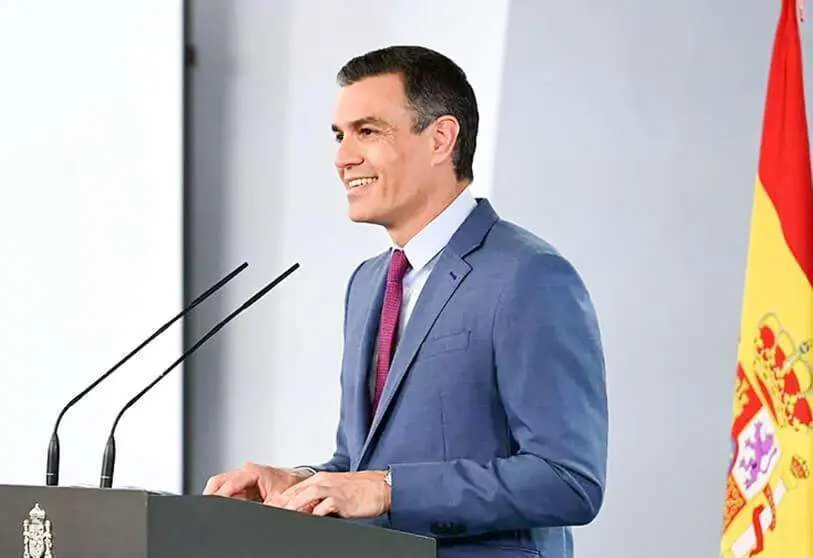Sánchez aligned with Morocco, via the United States

Russia's invasion of Ukraine has triggered a global geopolitical and geostrategic upheaval, forcing a clear choice between one side or the other. Between Algeria, Russia's ally, and Morocco, the choice was indisputable. But not only because of the need to stand up to Putin in all areas, including Africa, but also because of the enormous value of relations with Morocco in all economic, commercial, social and cultural sectors, including security and the fight against terrorism. And with another vital need for Spain to guarantee the not only Spanish but also European status of Ceuta, Melilla, the Canary Islands and their territorial waters, in addition to controlling migratory flows.
Pedro Sánchez's government was told by US Deputy Secretary of State Wendy Sherman during her visit to Madrid on 7 March of the opportunity to close the political crisis with Morocco by taking the side of the initiative for autonomy under Moroccan sovereignty for Western Sahara. A decision that sends a clear message to Algeria, whose reaction will be bitter, with its ambassador in Madrid being recalled for consultations, while some digital media describe it as the second historic betrayal of the Sahrawi people, after the 1975 agreements that left the Polisario Front out of the administration of the Sahara. The most critical decision that Algiers could take is to cut off the gas supply to Spain, but the previous negotiations with the Algerian government suggest that the revenue from gas payments, which will increase, is more necessary for the Algerian government than a supposed reaction of pride and retaliation. The Spanish government took good note when, on 1 November last year, Algeria unilaterally shut down the Maghreb-Europe gas pipeline because it passed through Morocco in retaliation for its disputes. Spain's demands to conserve the 6 billion cubic metres of gas from this source were to no avail.
The Spanish Minister of Foreign Affairs, José Manuel Albares, has affirmed that Algeria is a reliable partner, while describing Morocco as a strategic partner. Official sources assure that the option of closing the direct Medgaz pipeline from Algeria to Almeria in order to replace the volume of gas it supplies with other sources has been properly assessed and is considered unlikely. The option would be the United States and other markets with liquefied natural gas at an adjusted price, which would be regasified in Spain's seven stations. This aspect was also discussed with Wendy Sherman in Madrid before her visit the following day to Rabat, where she was able to overcome Morocco's recent reluctance to offer Spain guarantees regarding Ceuta, Melilla, territorial waters in the Canary Islands and the control of migratory flows. These guarantees have been one of the essential points of negotiation in recent months to overcome the political crisis between the two countries, which included the recovery of mutual trust with Spanish support for the autonomy of the Sahara under Moroccan sovereignty, as Rabat has been demanding. Sherman travelled to Algiers the following day to announce the agreement between Spain and Morocco and to demand Algerian cooperation in resolving the conflict and maintaining gas supplies.
The solution to this crisis between the two southern neighbours involves, among other issues, a strengthening of Morocco's relations with the European Union, where Germany also supports the Moroccan proposal for the Sahara, and where the pronouncement of France and Italy is only a matter of time. A step that is about to be taken by the United Kingdom, which has increased its economic and trade cooperation with Morocco, with an eye on the great potential for business and investment in Morocco's so-called southern provinces.
In Pedro Sánchez's government's decision to abandon its historic neutrality on the future of its former colony and opt for the autonomy offered by Morocco, the need to put an end to the precarious living conditions suffered by the more than 140,000 Sahrawis in the Tindouf camps, whose survival depends on international aid, increasingly scarce due to the doubts raised by the numerous complaints of repression, abuse and lack of freedom filed against the Polisario Front in recent years, has weighed heavily on the government. In addition, young Sahrawis are regularly recruited by terrorist groups in the Sahel region for little money to join their ranks. Family reunification of all Sahrawis, with housing, work, education, health care and a dignified life with a future, must be an inescapable goal for all, in this case for a Sahara under Moroccan sovereignty.
The efforts of European countries such as Spain and France in countries like Mali have been hampered by Russian interference in the area following the arrival of mercenaries from the Russian group Wagner, after the agreement offered by Moscow to the new Malian leader. Conditions have changed to such an extent that France has decided to withdraw its troops and Spain is studying, together with the European Union, how to deal with a delicate situation that directly affects the security and stability of the whole of North Africa and, therefore, of Europe.
The solution to the conflict must come within the United Nations with an agreement between the parties that have already held two rounds of negotiations in Geneva, with a somewhat positive atmosphere that was cut short when last November the Polisario Front and Algeria announced that they were abandoning this negotiating forum in protest at the new United Nations resolution that was approved on 9 December 2021 with the request to the parties to negotiate a political solution. A resolution that better served Morocco's interests and was welcomed by Rabat. An agreement between Morocco and Algeria, to restore their relations in a comprehensive manner, would be in the best interests of the two peoples who have been severely punished by the coronavirus.

